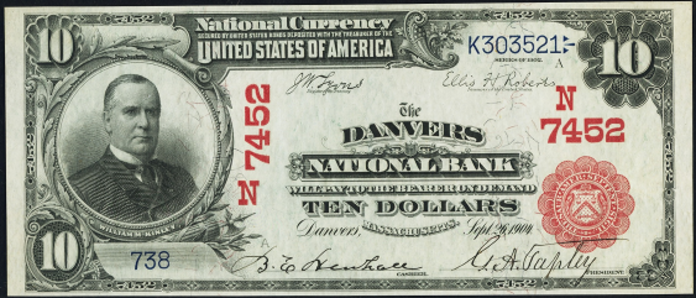Ten Dollar Notes › Nationals › 1902 Ten Dollar National Bank Notes › Utah Charters › 1902 $10 Murray Utah First National Bank
Get Value Now
| Item | Info |
|---|---|
| Series | 1902 |
| Charter | #6558 First National Bank of Murray, Utah |
| Year Chartered | 1902, 492 Banks Chartered |
| City Info | Murray City is a city situated on the Wasatch Front in the core of Salt Lake Valley in the U.S. state of Utah. Named for territorial governor Eli Murray, it is the state's fourteenth largest city. According to the 2010 census, Murray has approximately 46,746 residents. Murray shares borders with Taylorsville, Holladay, South Salt Lake and West Jordan, Utah. Once teeming with heavy industry, Murray’s industrial sector now has little trace and has been replaced by major mercantile sectors. Known for its central location in Salt Lake County, Murray has been called the Hub of Salt Lake County. Unlike most of its neighboring communities, Murray operates its own police, fire, power, water, library, and parks and recreation departments and has its own school district. While maintaining many of its own services, Murray has one of the lowest city tax rates in the state. Source: Wikipedia |
| Similar Cities | If your note doesn't match try: 1. Murray, Kentucky - First National Bank |
| Seal Varieties | Red, Blue |
| See Also | If your note doesn't match try: 1. 1907 $10 Gold Certificate 2. 1901 $10 Legal Tender 3. 1908 $10 Silver Certificates |
| Other Info | 1. Value depends on notes known for charter, condition and market demand. |
| Neat Fact | Some issues contain regional geographic identifiers. N = New England. E = Eastern. M = Midwest. S = Southern. W = Western. P = Pacific. The letters were included for hand sorting purposes (Kelley, 5th Ed. P 5). |
No Obligations Offers and Appraisals
Please submit a good photo or scan. It will be identified and evaluated. Understand there may be subtle differences between the image you see above and your note. Signatures, design, markings and note condition will determine the offer price. Notes in Uncirculated or better condition receive the best offers.
Appraisals can be estimated for wholesale and retail prices. Wholesale is what dealers typically pay. Retail is what a collector might pay. Retail is slightly higher in most cases.
Please visit this page for USA Paper Money Reference. Do not treat this page as a reference guide, it is for appraisal and acquisition purposes only.
